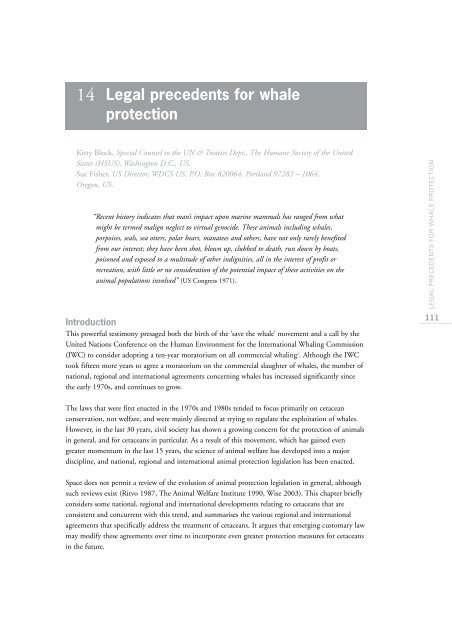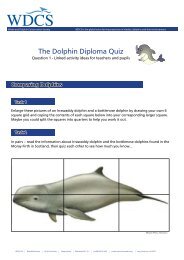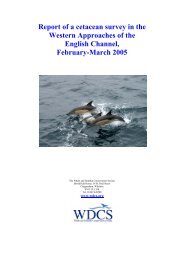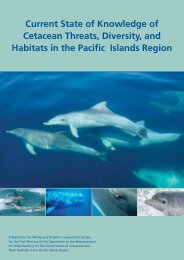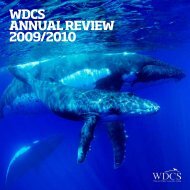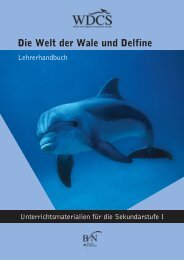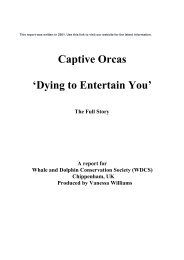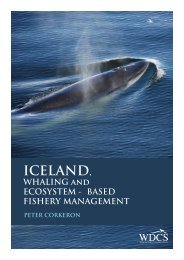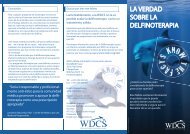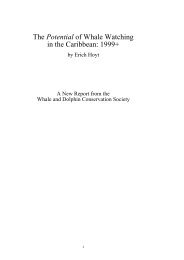TROUBLED WATERS - Whale and Dolphin Conservation Society
TROUBLED WATERS - Whale and Dolphin Conservation Society
TROUBLED WATERS - Whale and Dolphin Conservation Society
Create successful ePaper yourself
Turn your PDF publications into a flip-book with our unique Google optimized e-Paper software.
14 Legal precedents for whale<br />
protection<br />
Kitty Block, Special Counsel to the UN & Treaties Dept., The Humane <strong>Society</strong> of the United<br />
States (HSUS), Washington D.C., US.<br />
Sue Fisher, US Director, WDCS US, P.O. Box 820064, Portl<strong>and</strong> 97282 – 1064,<br />
Oregon, US.<br />
“Recent history indicates that man’s impact upon marine mammals has ranged from what<br />
might be termed malign neglect to virtual genocide. These animals including whales,<br />
porpoises, seals, sea otters, polar bears, manatees <strong>and</strong> others, have not only rarely benefited<br />
from our interest; they have been shot, blown up, clubbed to death, run down by boats,<br />
poisoned <strong>and</strong> exposed to a multitude of other indignities, all in the interest of profit or<br />
recreation, with little or no consideration of the potential impact of these activities on the<br />
animal populations involved” (US Congress 1971).<br />
Introduction<br />
This powerful testimony presaged both the birth of the ‘save the whale’ movement <strong>and</strong> a call by the<br />
United Nations Conference on the Human Environment for the International Whaling Commission<br />
(IWC) to consider adopting a ten-year moratorium on all commercial whaling 1 . Although the IWC<br />
took fifteen more years to agree a moratorium on the commercial slaughter of whales, the number of<br />
national, regional <strong>and</strong> international agreements concerning whales has increased significantly since<br />
the early 1970s, <strong>and</strong> continues to grow.<br />
The laws that were first enacted in the 1970s <strong>and</strong> 1980s tended to focus primarily on cetacean<br />
conservation, not welfare, <strong>and</strong> were mainly directed at trying to regulate the exploitation of whales.<br />
However, in the last 30 years, civil society has shown a growing concern for the protection of animals<br />
in general, <strong>and</strong> for cetaceans in particular. As a result of this movement, which has gained even<br />
greater momentum in the last 15 years, the science of animal welfare has developed into a major<br />
discipline, <strong>and</strong> national, regional <strong>and</strong> international animal protection legislation has been enacted.<br />
Space does not permit a review of the evolution of animal protection legislation in general, although<br />
such reviews exist (Ritvo 1987, The Animal Welfare Institute 1990, Wise 2003). This chapter briefly<br />
considers some national, regional <strong>and</strong> international developments relating to cetaceans that are<br />
consistent <strong>and</strong> concurrent with this trend, <strong>and</strong> summarises the various regional <strong>and</strong> international<br />
agreements that specifically address the treatment of cetaceans. It argues that emerging customary law<br />
may modify these agreements over time to incorporate even greater protection measures for cetaceans<br />
in the future.<br />
LEGAL PRECEDENTS FOR WHALE PROTECTION<br />
111


